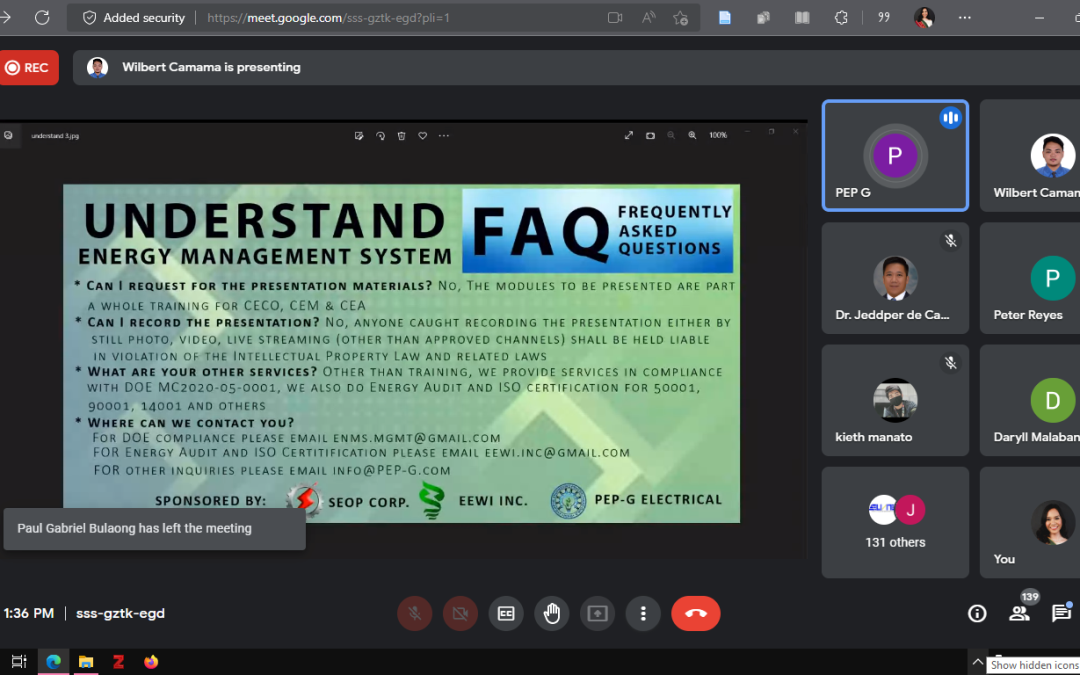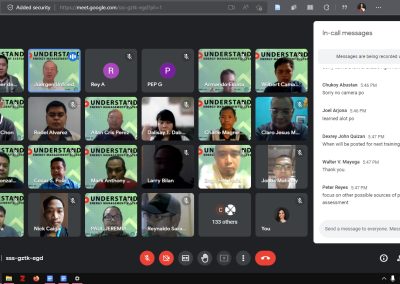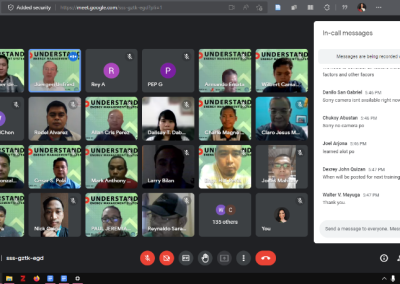Led by its Director, Engr. Rodel Hacla, the Energy Efficiency and Conservation Personnel and Campus EEC Coordinators attended the Web Seminar on Understanding Energy Management last August 6, from 1:30 until 5:30 in the afternoon.
Dr. Jeddper De Castro, President of ENPAP 4.0 Inc. and ASEAN and DOE Certified Energy Manager and Auditor, delivered the opening remarks. Following his talk on ISO SYSTEMS, he focused on ISO50001: 2018, which has three primary goals: resource conservation, climate change mitigation, and cost savings. De Castro further dwelled on existing regulations on energy saving and energy management such as the RA 11393 and RA 11697, otherwise known as the Electric Vehicle Industry Development Act, which lapsed into law on April 15, 2022.
“It’s also through the Republic Act 11285 or the Energy Efficiency and Conservation Act which was signed last April 12, 2019 that we’re able to amplify energy management and conservation,” he added. Dr. Jeddper also had a brief discussion about Organizational Structure and Site Layout, as well as the internal and external issues that must be addressed in an organization. According to his presentation, addressing such issues would allow the organization to better understand the needs and expectations of interested parties—customers, stakeholders, shareholders, the general public, regulatory agencies, administrators, and government agencies—allowing the organization to better serve its clients.
For the second speaker, Engr. Armando Emata, an ASEAN Certified Energy Manager and AEMAS Trainer provided an insightful discussion on Energy Saving. He presented various energy consuming devices or equipment, typical energy consumption breakdown, and typical facility energy breakdown.
“Since we are dealing with energy saving, the HVAC system or the Heating, Ventilating, and Air-conditioning is highly required. The importance of energy saving – fuel and electricity saving – in commercial properties or buildings could maximize our energy consumption,” Emata shared. Commercial properties such as retail, industrial, leisure, and healthcare establishments, he believes, should value the importance of simple energy conservation and workplace maintenance procedures even more than the importance of adhering to existing energy efficiency and conservation measures.
Finally, Professor Dr. Juergen Unfried, the ISO 50001 Energy Management Lead Auditor, focused on the discussion of monitoring operation performance. He emphasized that energy savings and consumption must always adhere to standard regulations. Simple steps such as greening roofs and using integrated solutions were cited as great ways to save energy for heating and cooling; the use of operations and software with automation experience, as well as the use of sustainable packaging—improving material resources and reducing resource squandering—is regarded as one of the best ways to save energy. Furthermore, the establishment of an Energy Management System (Database System) is critical for monitoring operational performance.
“We should always monitor various energy sources, and always have an overview -on year changes. This will allow us to review previous energy saving mechanisms, to see how much increase or decrease has made, and to assess whether our ways on nergy saving are working,” Prof. Juergen said. He also added that machinery energy usage, reference numbers (reports, reviews, and ratings), and reduction measures and results have been considered as pillars in determining whether a certain energy saving method works.
The 5-hour web seminar was carefully designed to align with the Department of Energy Training Regulations Requirement for Certified Energy Conservation Officer Training Code: UTL311208, Certified Energy Manager Training Code: DOE-CEN-10, and Certified Energy Auditor Training Code: DOE-CEA-10. It was delivered via Google Meeting. It was also attended by various electrical engineering practitioners and energy conservationists across the nation.


